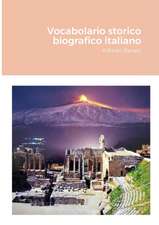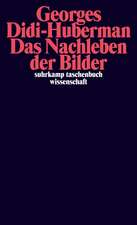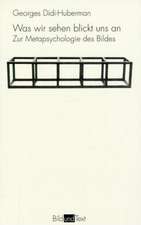Atlas, or the Anxious Gay Science
Autor Georges Didi-Huberman, Shane B. Lillisen Limba Engleză Hardback – 6 dec 2018
Aby Warburg’s Mnemosyne Atlas (1925–1929) is a prescient work of mixed media assemblage, made up of hundreds of images culled from antiquity to the Renaissance and arranged into startling juxtapositions. Warburg’s allusive atlas sought to illuminate the pains of his final years, after he had suffered a breakdown and been institutionalized. It continues to influence contemporary artists today, including Gerhard Richter and Mark Dion.
In this illustrated exploration of Warburg and his great work, Georges Didi-Huberman leaps from Mnemosyne Atlas into a set of musings on the relation between suffering and knowledge in Western thought, and on the creative results of associative thinking. Deploying writing that delights in dramatic jump cuts reminiscent of Warburg’s idiosyncratic juxtapositions, and drawing on a set of sources that ranges from ancient Babylon to Walter Benjamin, Atlas, or the Anxious Gay Science is rich in Didi-Huberman’s trademark combination of elan and insight.
In this illustrated exploration of Warburg and his great work, Georges Didi-Huberman leaps from Mnemosyne Atlas into a set of musings on the relation between suffering and knowledge in Western thought, and on the creative results of associative thinking. Deploying writing that delights in dramatic jump cuts reminiscent of Warburg’s idiosyncratic juxtapositions, and drawing on a set of sources that ranges from ancient Babylon to Walter Benjamin, Atlas, or the Anxious Gay Science is rich in Didi-Huberman’s trademark combination of elan and insight.
Preț: 327.54 lei
Nou
Puncte Express: 491
Preț estimativ în valută:
62.68€ • 65.20$ • 51.75£
62.68€ • 65.20$ • 51.75£
Carte disponibilă
Livrare economică 24 martie-07 aprilie
Livrare express 08-14 martie pentru 42.12 lei
Preluare comenzi: 021 569.72.76
Specificații
ISBN-13: 9780226439471
ISBN-10: 022643947X
Pagini: 400
Ilustrații: 73 halftones
Dimensiuni: 140 x 216 x 36 mm
Greutate: 0.61 kg
Ediția:1
Editura: University of Chicago Press
Colecția University of Chicago Press
ISBN-10: 022643947X
Pagini: 400
Ilustrații: 73 halftones
Dimensiuni: 140 x 216 x 36 mm
Greutate: 0.61 kg
Ediția:1
Editura: University of Chicago Press
Colecția University of Chicago Press
Notă biografică
Georges Didi-Huberman is a French philosopher and art historian who teaches at the École des Hautes études en Sciences Sociales in Paris. Shane Lillis is a translator.
Cuprins
List of Figures
I. Disparates: “Reading What Was Never Written”The Inexhaustible, or Knowledge through Imagination
Heritage of Our Time: The Mnemosyne Atlas
Visceral, Sidereal, or How to Read the Liver of a Sheep
Madness and Truths of the Incommensurable
Tables for Collecting the Parceling-Out of the World
Heterotopias, or the Cartographies of Defamiliarization
Leopard, Starry Sky, Smallpox, Spatter
II. Atlas: “Carrying the Whole World of Sufferings”Heritage of Our Time: The Mnemosyne Atlas
Visceral, Sidereal, or How to Read the Liver of a Sheep
Madness and Truths of the Incommensurable
Tables for Collecting the Parceling-Out of the World
Heterotopias, or the Cartographies of Defamiliarization
Leopard, Starry Sky, Smallpox, Spatter
A Titan Bent under the Burden of the World
Gods in Exile and Knowledge in Suffering
Survivals of Tragedy, Aurora of the Anxious Gay Science
“El sueño de la razón produce monstruos”
An Anthropology from the Point of View of the Image
Samples of Chaos, or the Poetics of Phenomena
Points of Origin and Links of Affinity
Atlas and the Wandering Jew, or the Age of Poverty
III. Disasters: “The Dislocation of the World: That Is the Subject of Art”Gods in Exile and Knowledge in Suffering
Survivals of Tragedy, Aurora of the Anxious Gay Science
“El sueño de la razón produce monstruos”
An Anthropology from the Point of View of the Image
Samples of Chaos, or the Poetics of Phenomena
Points of Origin and Links of Affinity
Atlas and the Wandering Jew, or the Age of Poverty
Tragedy of Culture and Modern “Psychomachias”
Explosions of Positivism, or the “Crisis of European Sciences”
Warburg Facing the War: Notizkästen 115–18
The Seismograph Explodes
Panoramic Tables to Return from the Disaster
The Atlas of Images and the Surveying Gaze (Übersicht)
The Inexhaustible, or Knowledge through Re-montage
Explosions of Positivism, or the “Crisis of European Sciences”
Warburg Facing the War: Notizkästen 115–18
The Seismograph Explodes
Panoramic Tables to Return from the Disaster
The Atlas of Images and the Surveying Gaze (Übersicht)
The Inexhaustible, or Knowledge through Re-montage
Bibliographical Note
Notes
Bibliography
Index
Notes
Bibliography
Index
Recenzii
"The central question in the books in the series is how images––or better, a montage of images––can provide a form of knowledge about various forms of oppression and suffering throughout the course of history, conjoined with a desire to rise up against this oppression and to cope with the burden: a predicament for which the mythological figure of Atlas serves as an emblem. . . . The book itself offers a wealth of reflections on artists such as Francisco Goya, Charles Baudelaire, Katsushika Hokusai and others, and explores theoretical insights from Michel Foucault, Gilles Deleuze, Georges Bataille, and Theodor Adorno. The sheer number of artists and theorists that make an appearance in the book and that Didi-Huberman discusses is truly overwhelming. When reading the book, which pairs many images with Didi-Huberman’s beautiful sentences . . . it becomes apparent that the style of the book reflects its topic: just like the atlas, Didi-Huberman imaginatively traces affinities and correspondences between various artists and theorists without glossing over their differences. . . . With Atlas, or the Anxious Gay Science, the English reader has now one of the best entry points into the fascinating and ever-expanding universe that Didi-Huberman has been creating and in which it is a great pleasure to lose oneself."








